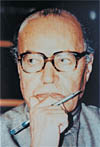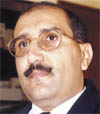Dr. Mohammed Ali Moqbil: “Productive change is a slow and gradual process.” [Archives:1997/50/Interview]
Dr. Mohammed Ali Moqbil is a member of parliament, a member of the Permanent Committee of the People’s General Congress, and Board Chairman of the Yemen Drug Company (YEDCO). For five years, 1988 to 1993, Dr. Moqbil, 51, occupied the post of Minister of Health. He is today, one of the leading parliamentarians who is involved in political reform. Dr. Moqbil is also deep at work in his effort to overhaul YEDCO. Bin Sallam of Yemen Times talked to Dr. Moqbil and filed the following interview. Excerpts:
Q: It has been about eight months since your election to parliament. How do you evaluate that period? A: We are still at the beginning of the democratic process and parliamentary work is still somewhat limited. The most important thing is conviction. We have made our choice by going on the path of democracy where the people freely choose their own representatives. Although the past period of the new parliament’s life is short, several laws, agreements, and parliamentary committee reports were reviewed and ratified. We are very particular that parliament’s legislative and monitoring roles should be fully carried out so that it can actively conduct its constitutional duties. Parliament should not only legislate, but also monitor the implementation of its legislations. Monitoring should not be limited to the executive organs, but must include monitoring in its broader sense as specified by the constitution. If parliament is able to follow up the implementations of its legislation and monitor the government’s performance, then we can say that our parliament is really representing the will of the people.
Q: What distinguishes this parliament from the previous one elected after unification, by way of mentality, cultural level, intellect, etc? A: I believe that this parliament reflects the present political and social map of the country as well as the extent of public awareness. I believe there are good, competent, and highly experienced elements in this parliament. I hope that the democratic process will develop more, but I think that the previous political map was somewhat better than the current one.
Q: What sort of problems do MPs face in general? A: I don’t really think that there are any major problems worth mentioning. As long as parliament correctly dispenses its constitutional and legal authorities, I don’t think there will be any problems. The only problem I have noticed up to now is daily absenteeism. The parliament’s Presidium will have to tackle this problem by looking into its root causes. As a matter of fact, there are special regulations which govern this aspect of parliamentary life which must be fully enforced. Many MPs, however, come from remote regions, have to endure arduous journeys, and look for a suitable accommodation while in Sanaa. So I think that the state should provide MPs with residence and a few other essential privileges. An MP’s pay is quite modest, not enough to cover his or her basic personal expenditure – taking into account the need for accommodation, guards, etc. Many MPs also incur miscellaneous expenses with regards to solving some of their constituents’ personal problems and needs such as medical treatment, funerals, weddings, etc. An MP in Yemen cannot just simply refuse his or her constituents’ demands. Frankly speaking, some PMs, including myself, had to borrow money in order to honor their social commitments. It is a real problem that faces many of my colleagues. This dilemma must be seriously considered by the state.
Q: We hear that many of your constituents come to you to solve their personal problems instead of the area’s tribal sheikh or elder. Doesn’t this distract the MP from his or her duties? A: Many people view their MP not as a sheikh or social reformer, but as someone who has a duty towards the citizens who elected him. So a constituent feels that his or her interests are closely connected to the MP. If there is any lack of public services such as schools, health centers, electricity, water, etc, people hurry to their representative in parliament. Sometimes the problems people bring to their MP go beyond his capacity. I believe that the executive organs should take the initiative by providing these services to the public, and do not wait for the MPs to intervene.
Q: How do MPs usually go about demanding better services for their constituencies? A: The Sanaa bloc of MPs, for example, meet regularly with ministers and other government officials regarding issues of public hygiene, the environment, etc. The citizens’ needs are often public in nature, not individual. That is why we as MPs have to continuously strengthen our ties with our constituents. It is a difficult task and needs the cooperation of all sectors of society.
Q: What major laws and legislation were ratified by parliament up until now? A: The laws discussed by the previous parliament were in actual fact republican decrees submitted to parliament for endorsement. They included the law to found the school renovation fund and the military penal law. We are now discussing the advocacy law and the real estate and public lands law. There are other decrees and oil agreements being presently discussed.
Q: Some MP feel frustrated as if they are not in control. What do you think about that? A: I cannot say that is true because it is not. MPs have many duties and responsibilities which they have to perform as best as they can. There are draft laws to be studied and agreements to be reviewed. MPs have to constantly observe the high national interest in everything they do. I think MPs are treated differently, as elected not appointed people. An MP must be granted all rights and privileges that help him or her carry out the tasks and duties he or she is entrusted with, including the electioneering program. All executive organs must realize that when an MP deals with them it is not for his or her own gains but for that of the citizens he or she came to represent.
Q: Let’s move now to the Yemen Drug Company (YEDCO), of which you are board chairman. How did you find it when you assumed the chairmanship? A: YEDCO has three different factories – one for drugs, the other for solutions, and the third for packaging. As far as production, maintenance, and marketing are concerned, YEDCO is now better than before. We face many problems including the taxes that have been accumulating from 1986 to 1992. We worked with the relevant bodies such as the Ministry of Finance, the Control and Audit Authority, and the Tax Authority. A joint committee was formed from the representative of YEDCO and these other organs to re-schedule the company’s debts, around YR 120 million over a period of 10 years. I sincerely thank Mr. Ahmed Al-Iryani, the head of the Control and Audit Apparatus; the Minister of Finance, and the head of the Tax authority for their cooperation. Other problems faced by YEDCO include complicated law suits over land disputes, which I fear will not come to a satisfactory resolutions, considering the prevalent corruption in Yemeni courts. All of this hinders the company’s productivity and marketing ability. Moreover, there are now court cases over disputes with some of our competitors who took over some of our more lucrative agencies of international drug companies. We really feel that the courts should swiftly look into and resolve these cases so that YEDCO will be able to better serve the people. Our policy is to provide exceptional medicinal services at very competitive prices. YEDCO sometimes sells some brands of its products at cost value in order to help people with limited income. We still adhere to the prices specified by the Supreme Drug Authority, which means making very low profits indeed as compared to other more commercial drug manufacturers. Thus, YEDCO participates in alleviating some of the people’s burdens by offering a wide range of about 53 different types of medicines to the public at very low prices. I think that the state and the judicial system should support YEDCO. Also, the free-market economy presently adopted by our country demands that YEDCO be very competitive by providing a better service at a lower price. The better service comes through improving our medicinal products according to international standards. Some people, however, try to tarnish YEDCO’s good image. For instance, Paramol – the popular pain killer produced by YEDCO – is being produced in India and Thailand under the same brand name but with low quality. It is being smuggled in large amounts into Yemen. The law must protect our national products from piracy by unscrupulous manufacturers. A free-market economy doesn’t mean by any stretch of the imagination stealing the efforts of others for making a quick buck.
Q: What drug agencies has YEDCO lost? A: YEDCO lost agencies from some very famous international drug companies such as the Swiss Roche, the Italian Ciba, and a few others which were taken by the private sector. We have not got any positive response from the relevant state organs when we asked them to stand by us to get our rights back. We hope that justice will prevail in the end despite the long delays experienced at commercial courts.
——
[archive-e:50-v:1997-y:1997-d:1997-12-15-p:./1997/iss50/intrview.htm]


